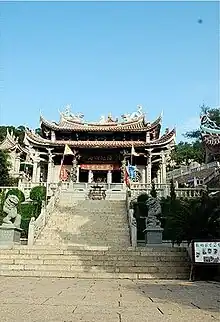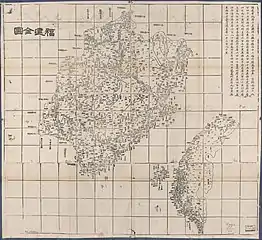
Meizhou Island (simplified Chinese: 湄洲岛; traditional Chinese: 湄洲島; pinyin: Méizhōu Dǎo; Pu-Xian Min: Mî-ciu-doh), Meichow;[1] Meichou,[2] is a small island close to the coast of China. Meizhou Town (湄洲镇) is an administrative unit of Xiuyu District, Putian, Fujian, China. It is known for being the birthplace of the goddess Mazu. Meizhou has 38,000 inhabitants, most of whom are involved in the fishing industry. The local language spoken is Pu-Xian Min.
History

An open provincial tourism economic region (旅游经济区) since June 1988, in April 1992 Meizhou Island introduced a landing visa policy for visitors from Taiwan. In October of the same year it became a national tourism-vacation region (国家旅游度假区). The island was formally opened to visitors from overseas in October 1999.
Annually, Taiwanese pilgrims come to Meizhou to see the place where Mazu once lived.[3] Under Xi Jinping, Mazu-related pilgrimages have become an avenue for Chinese Communist Party influence operations to promote Chinese unification.[3][4]
Administration
Meizhou Island is administered by Meizhou Town, an area that is divided into 11 villages:
- Gaozhu (高朱)
- Xiashan (下山) "Downhill"
- Lianche (莲池) "Lotus Pond"
- Beidai (北埭 dài) "North Dam"
- Dongcai (东蔡) "The East Cais"
- Xiting (西亭) "The Western Pavilion"
- Ganglou (港楼) "The Tower by the Port"
- Zhaixia (寨下) "Lower Village"
- Dayang (大洋) "Great Ocean"
along with three others.
Geography
Located in the northern part of the mouth of Meizhou Bay, Meizhou Island covers an area of 14.35 km2 (5.54 sq mi) and measures 9.6 kilometres (6.0 mi) north-south, and 1.3 kilometres (0.81 mi) east-west. The beach runs for around 20 kilometres (12 mi).
Tourist attractions
The Heavenly Empress Palace-Meizhou Ancestral Temple (天后宮湄洲祖廟) began as a small shrine soon after Mazu's death in the 10th century. It has now been renovated and greatly enlarged to accommodate pilgrims.
See also
References
- ↑ Edward Stanford (1908). Atlas of the Chinese Empire (1 ed.). pp. 24, 81.
Meichow{...}Meichow (island), Fukien 25.4 N 119.8 E
- ↑ "Current Intelligence Bulletin". CIA. 7 February 1956. p. 4. Retrieved 18 August 2019.
Meichou
- 1 2 "China hopes Mazu, a sea goddess, can help it win over Taiwan". The Economist. June 15, 2023. ISSN 0013-0613. Archived from the original on 2023-06-15. Retrieved 2023-06-16.
Officials in Beijing hope Mazu will help them in a different way. The United Front Work Department, the Communist Party branch with the job of boosting China's influence abroad, views the goddess as a tool to win Taiwanese hearts and minds. Mazu—or Lin Moniang, as she was known before becoming a goddess—hailed from a small fishing village on the island of Meizhou in the province of Fujian. Today worshippers make pilgrimages to her ancestral temple there. That is useful to China, which has been supporting Mazu-related cultural exchanges with Taiwan since the late 1990s. Local offices of the United Front talk openly of using Mazu to "strengthen Taiwan's patriotic unification force". If they can turn Taiwan's love of Mazu into love of the motherland, that would make it easier to peacefully bring Taiwan back under the mainland's rule.
- ↑ "China's atheist Communist Party encourages folk religion". The Economist. September 19, 2019. ISSN 0013-0613. Archived from the original on 2023-06-16. Retrieved 2023-06-16.
In 2011 Mr Xi urged officials to "make full use" of Mazu to woo Taiwanese, most of whom have ancestral ties with the mainland.
External links
- Six photos of the Matsu ceremony in Meizhou (in Chinese)
- 湄洲岛管委会 (in Chinese)